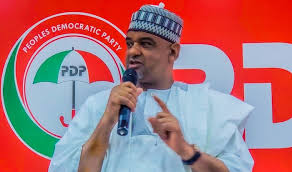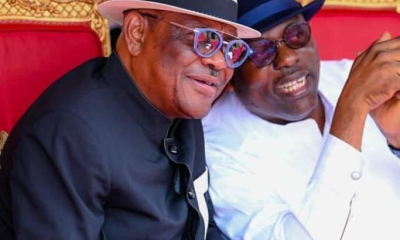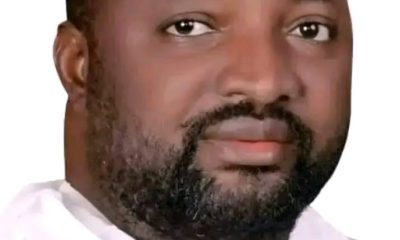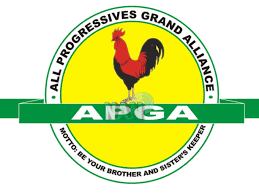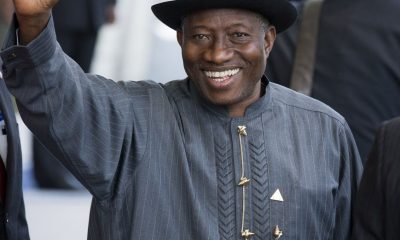OPINION
Atiku, not Wike, is PDP’s problem
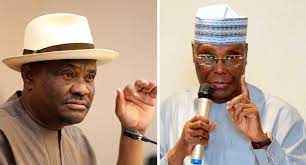
By Niran Adedokun
Until recently, I considered Alhaji Atiku Abubakar, the presidential candidate of the Peoples Democratic Party (PDP), one of Nigeria’s most prepared aspirants.
Atiku, who has become a career aspirant for Nigeria’s presidency, is one of the very few hopefuls with a road map to the nation’s reformation.
The road map identifies Nigeria’s problems and how to tackle them. I argue that the “know-how” is a critical competence required of prospective leaders and an aspirant who goes further by putting his thoughts on paper should offer some allure. His recent interview with the Arise News Channel, however, left me with a competing impression.The candidate was tentative in his answers to some of the critical questions that his interviewers posed. Unlike Olusegun Obasanjo, Atiku’s principal, when he served as vice president between 1999 and 2007, this man displayed a superficial, sometimes nonchalant understanding of some of the issues. An example of this was his reaction to the recent transition of the Nigerian National Petroleum Corporation (NNPC) into a commercial entity. This, for example, showed that the PDP candidate was oblivious to the Petroleum Industry Act (2021). That is inconceivable.
They asked him about education and health. Atiku spoke about his investments in education, and how to equip universities and pay salaries. I thought that was pedestrian. While it is commendable to equip the universities and pay lecturers well, Nigeria’s leader post-2023 must understand that basic education is the most fundamental, that not everyone needs a university education, and that vocational education is as important to national development as formal education. About health, he just brushed past private hospitals servicing more people in Lagos state. There was nothing about how to increase and improve access to health insurance and all. It was disappointing!
In saying this, I acknowledge the fact that it is not yet time for campaigns, but a candidate must show his understanding of the problems and capacity to solve them at every opportunity. There is a more fundamental revelation of the Atiku persona from that interview. That is his dismissive, if not haughty, disposition on some points raised by his interviewers. These range from his response to the fallout of the presidential primaries involving Governor Nyesom Wike of Rivers state, zoning in the PDP, the chances of the candidate of the Labour Party, Peter Obi, and his triumphant exposure of the poor state of internet penetration in northern Nigeria. At the end of that interview, you wondered whether Atiku depended on something more than the votes of Nigerians to win this coming election. He made only feeble attempts to convince.
This overconfidence is also what bogs down the PDP with the fallout of its presidential primaries, almost three months after the exercise. Someone could argue that all the shenanigans are parts of politics, but the PDP’s situation has become a handshake beyond the elbow. This is no longer party camaraderie but a mindless struggle for power, with no thought about the people these guys claim to represent. Every day, someone is discussing these PDP issues on one television show or the other. There are daily reports of committees upon committees, all amounting to so much motion without movement for the party, which prides itself on being the biggest opposition party in the country. It is all so obscene and offensive to Nigerians’ sensibilities.
Yet, Atiku allowed this problem to fester. What one sees in the presidential candidate for the better part of the past three months is an attempt to call the bluff of Wike over his reaction to the choice of Governor Ifeanyi Okowa as Atiku’s running mate in June. Many people have accused Wike, known for his loquaciousness and tendency to overreach, of asking too much from the PDP but what would they have him do? From what I read of the situation, Wike’s contention is not so much about his rejection as Atiku’s running mate, but how the candidate managed the process. And in the aftermath of this, he has demanded some zonal balance in the party’s leadership structure. The call for Iyorcha Ayu’s resignation as chairman signifies this.
Truly, the Rivers state governor carried on like the PDP is his personal estate until recently. But as presumptuous and irritating of him as that may sound, it wasn’t without foundation. When everyone, including Atiku and former presidents elected on the platform of the PDP, abandoned the party after the 2015 elections, Wike alongside former Governor Ayodele Fayose of Ekiti state remained the only voices that spoke for and held the party together. That should count for something. But at the moment, Wike doesn’t have much stake in the PDP. Even if he reconciles with Atiku and the latter wins the election, a president keeps control of the whip and can use it as he sees fit on anyone, whether they erred in the past or are just contemplating it. There are no guarantees of Wike’s relevance in post-election PDP, especially when the standard bearer shows little regard for him ahead of elections.
Here again, you wonder what the presidential candidate relies on to win in 2023. For anyone who is contesting elections against formidable oppositions like Asiwaju Bola Tinubu and the meteorically rising Obi, the expectation is that no one is too insignificant for a rapprochement. This is a lot about the governor of a state which has presented the highest votes (in the southern part of the country over the past few elections) for your party. It is not just that, with Nigeria’s current state where identity has become a factor, Wike’s campaign for zonal balance may win more support in the southern part of the country and detract from Atiku’s chances. Atiku must know this, yet he has allowed this issue to drag, allegedly seeking alternative alliances in Rivers state to whittle down the governor’s influence.
But all of this tells more about what Atiku may look like as president than Wike’s relevance to his election. Leadership is not just about knowing what to do, it is also about the capacity to focus on the most important goals. Leadership is a place of humility, a place of service where, rather than lord it on people, you empathise with them and sacrifice for the good of all. It is a place where you suppress your ego and increase your capacity to forgive, forget, and move on. Leadership comes with a responsibility for ensuring unity.
Atiku’s handling of this PDP debacle is a referendum on his capacity to bring Nigeria back on track. If this man cannot stop a raging fire in your minuscule political party until it becomes a national eyesore, how does he hope to bring peace and unity to Nigeria?
Many people think that Nigeria’s problem is just economic, but there is the more fundamental question of restoring trust for one another, and for the country in Nigerians. What will serve this country most in the coming years is to elect a leader with the political wisdom to come down to the level of every segment of the country and give them a sense of belonging. That is the first step to any form of prosperity in a country that is only one president from survival or damnation.
OPINION
President Bola Tinubu: Establish a National Bureau for Ethnic Relations and Inter Group Unity

By Wilfred Uji
I once wrote an article based on a thorough research that all the states of North Central of Nigeria, Kwara, Niger, Kogi, Benue, Plateau and Nasarawa States, share a great deal of historical relations, resources, ethnicity and intergroup relations. These states have a common shared boarders with common security challenges that can only be effectively managed and resolved from a regional perspective and framework.
The exercise at the creation of states have overtime drawn arbitrary boundaries which in contemporary times are critical security and developmental issues that affects the sub region.
Firstly is the knowledge and teaching of history that can help grow and promote a regional unity and intergroup relations.
As far back as the pre-colonial era, the North Central of Nigeria had a plethora of multi ethnic groups which co-existed within the framework of mutual dependence exploiting indigenous peace initiatives. The diverse ethnic groups comprising of Nupe, Gwari, Gbagi, Eggon, Igala, Idoma, Jukun, Alago, Tiv, Gwanadara, Birom, Tarok, Angas, etc were independent state sovereignties before the advent of British colonial rule by the first quarter of the twentieth century.
Secoundly that British colonialism for economic and political exigencies almagamated all these ethnic groups under the Northern Region with headquarters first at Lokoja and later moved to Kaduna.
The indirect rule policy placed all the traditional political chiefdoms of the sub region under the political supervision, for the convience of taxation and draft labor, under the Sokoto Caliphate.
The indirect rule political structure was not intended to be a game changer that would enforce the dominance and hegemony of the Sokoto Caliphate over the people, land and resources of the sub region.
Thirdly, in the realization of the above, the British colonial state first created the Munchi Province and later the Benue Province as a political and state framework that could accommodate all the ethnic diversity of some of the North Central people.
State creation which ought to allow room for minority representation and expression, over time, has been turned upside down, by some ethnic groups as a vehicle of the exclusion of some minority groups.
For instance, the creation of Benue State in 1976 and Nasarawa State in 1996, does not signify and imply the exclusion of the Tiv and Idoma from Nasarawa State as well as the exclusion of the Alago and Jukun from Benue State.
These ethnic groups, long before state creation, had indigenous roots in all the states of the North Central of Nigeria. Historically, it is misleading and erroneous for these ethnic nationalities to be regarded as tenant settlers in the states where they are located.
The term tenant settlers have been used by the ruling political class of some states of the North Central of Nigeria as a staging point for land grabbing, genocide, land claims and struggles that has created a night mare for the security landscape of the region. In contemporary times, there is no denying the fact that there is an ethnic question in the North Central of Nigeria where there has been a revival of ethnic nationalism by some irredentist groups reinforced by revisionist historians. The ethnic nationalism which on one hand is a cultural revival but on the other promotes a hate agenda, is dangerous and antithetical to the inter group relations and unity of the North Central of Nigeria.
Ethnic hate, the idea that some ethnic nationalities do not belong or have indigenous roots in a state, has been responsible for some of the modern genocide and massacre in the history of modern Nigeria.
For political and security reasons, there is scanty research in this regard, the study of modern genocide backed by state action. Or where such research exist, it is often play down and watered as inter group conflicts and violent hostilities that should be treated with kids gloves and palliatives. This liberal and pessimistic approach to conflict management has been a responsible factor in the decimal reoccurrence of violent ethnic conflicts of the North Central States. The Liberal approach to conflict management, looks at the symptoms instead of the treatment of the disease.
Ethnocentrism is both an African and Nigerian reality that over time and space has been fueled and exploited by the ruling political class and elites. It is one of critical challenge of nation building in Africa that appears to be a curse of a continent and people.
All nations of the world have their share of the nightmare of ethnic and racial bigotry at one point or the other in their national history and transformation.
In the United States of America, it was dubbed the race question in the post emancipation era, the politics of the color line as William Dubios described the racial tension and phenomenon of his prevailing age and society. The race question sparked many reactions including the establishment of societies and organizations for the protection of the African American as well as the defence of the fundamental civil rights of the “American Negro”.
One of such initiative adopted by the State in America which was aimed at the improvement of the welfare and wellbeing of the African American as as his integration into main stream society was the establishment of the Bureau For Freed Men on race relations. The Bureau as a Federal institution was designed for the reconciliation of the inequality and segregation of the African American inorder for him to access equitable development and national resources, but, more importantly, political representation at both state and national level.
Subsequently, the Bureau came up with a number of proactive programmes and policies including the Affirmative Action as well as Federal Character Quota Systems that ensured the equitable and just integration of African Americans in main stream society and politics.
In recent years, Nigeria has established some regional frameworks that can translate into the creation of a Bureau for Ethnic Relations. One of such regional framework is the establishment of the North Central Development Commission by President Bola Ahmed Tinubu.
The Development Commission if strategically placed and positioned, can create a Bureau For Ethnic Relations that will help promote and reconcile inter-ethnic relations and development within the North Central of Nigeria.
I am limited as to the mandate of the commission interms development and the transformation of the North Central of Nigeria.
If the commission suffers from a deficit to manage ethnic relations along the lines of affirmative action and federal character principle, then, the federal government should as a matter of social priority establish an Bureau For Ethnic Relations of the six geopolitical units of Nigeria.
Let me end this write up by using the words of William Dubios that the challenge of Nigeria in the twenty first century is that of ethnic relations, it is that of the ethnic content, that of fairer skin races to that of the dark skin races.
Prof. Uji Wilfred is from the Department of History and International Studies, Federal University of Lafia
Education
Varsity Don Advocates Establishment of National Bureau for Ethnic Relations, Inter-Group Unity

By David Torough, Abuja
A university scholar, Prof. Uji Wilfred of the Department of History and International Studies, Federal University of Lafia, has called on the Federal Government to establish a National Bureau for Ethnic Relations to strengthen inter-group unity and address the deep-seated ethnic tensions in Nigeria, particularly in the North Central region.
Prof.
Wilfred, in a paper drawing from years of research, argued that the six states of the North Central—Kwara, Niger, Kogi, Benue, Plateau, and Nasarawa share long-standing historical, cultural, and economic ties that have been eroded by arbitrary state boundaries and ethnic politics.According to him, pre-colonial North Central Nigeria was home to a rich mix of ethnic groups—including Nupe, Gwari, Gbagi, Eggon, Igala, Idoma, Jukun, Alago, Tiv, Birom, Tarok, Angas, among others, who coexisted through indigenous peace mechanisms.
These communities, he noted, were amalgamated by British colonial authorities under the Northern Region, first headquartered in Lokoja before being moved to Kaduna.
He stressed that state creation, which was intended to promote minority inclusion, has in some cases fueled exclusionary politics and ethnic tensions. “It is historically misleading,” Wilfred stated, “to regard certain ethnic nationalities as mere tenant settlers in states where they have deep indigenous roots.”
The don warned that such narratives have been exploited by political elites for land grabbing, ethnic cleansing, and violent conflicts, undermining security in the sub-region.
He likened Nigeria’s ethnic question to America’s historic “race question” and urged the adoption of structures similar to the Freedmen’s Bureau, which addressed racial inequality in post-emancipation America through affirmative action and equitable representation.
Wilfred acknowledged the recent creation of the North Central Development Commission by President Bola Tinubu as a step in the right direction, but said its mandate may not be sufficient to address ethnic relations.
He urged the federal government to either expand the commission’s role or create a dedicated Bureau for Ethnic Relations in all six geo-political zones to foster reconciliation, equality, and sustainable development.
Quoting African-American scholar W.E.B. Du Bois, Prof. Wilfred concluded that the challenge of Nigeria in the 21st century is fundamentally one of ethnic relations, which must be addressed with deliberate policies for unity and integration.
OPINION
The Pre-2027 Party gold Rush
By Dakuku Peterside
The 2027 general elections are fast approaching, and Nigeria’s political landscape is undergoing a rapid transformation. New acronyms, and freshly minted party logos are emerging, promising a new era of renewal and liberation.To the casual observer, this may seem like democracy in full bloom — citizens exercising their right to association, political diversity flourishing, and the marketplace of ideas expanding.
However, beneath this surface, a more urgent reality is unfolding. The current rush to establish new parties is less about ideological conviction or grassroots movements and more about strategic positioning, bargaining leverage, and transactional gain.It is the paradox of Nigerian politics: proliferation as a sign of vitality, and as a symptom of democratic fragility. With 2027 on the horizon, the political air is electric, not with fresh ideas, but with a gold rush to create new political parties.Supporters call it the flowering of democracy. But scratch the surface and you will see something else: opportunism dressed as pluralism. This is not just politics; it is political merchandising. Parties are being set up like small businesses, complete with negotiation value, resale potential, and short-term profit models. Today, Nigeria has 19 registered political parties, one of the highest numbers in the world behind India (2,500), Brazil (35), and Indonesia (18).History serves as a cautionary tale in this context. Whenever Nigeria has embraced multi-party politics, the electoral battlefield has eventually narrowed to a contest between two main poles. In the early 1990s, General Ibrahim Babangida’s political transition programme deliberately engineered a two-party structure by decreeing the creation of the National Republican Convention (NRC) and the Social Democratic Party (SDP).His justification was rooted in the observation — controversial but not entirely unfounded — that Nigeria’s political psychology tends to gravitate toward two dominant camps, thereby simplifying voter choice and fostering more stable governance. Pro-democracy activists condemned the move as state-engineered politics, but over time, the pattern became embedded.When Nigeria returned to civilian rule in 1999, the Peoples Democratic Party (PDP) emerged as the dominant force, facing off against the All People’s Party (APP) and Alliance for Democracy (AD) coalition. The 2003 and 2007 elections pitted the PDP against the All Nigeria Peoples Party (ANPP); in 2011, the PDP contended with both the ANPP and the Congress for Progressive Change (CPC).By 2015, the formation of the All Progressives Congress (APC) — a coalition of the CPC, ANPP, Action Congress of Nigeria (ACN), and a faction of the All Progressives Grand Alliance (APGA) — restored the two-bloc dynamic. This ‘two-bloc dynamic’ refers to the situation where most of the political power is concentrated within two main parties, leading to a less diverse and competitive political landscape. Even when dozens of smaller parties appeared on the ballot, the real contest was still a battle of two heavyweights.And yet, here we are again, with Nigeria’s Independent National Electoral Commission (INEC) registering nineteen parties but facing an avalanche of new applications — 110 by late June, swelling to at least 122 by early July. This surge is striking, especially considering that after the 2019 general elections, INEC deregistered seventy-four parties for failing to meet constitutional performance requirements — a decision upheld by the Supreme Court in 2021.That landmark ruling underscored that party registration is not a perpetual license; it is a privilege conditioned on meeting electoral benchmarks, such as a minimum vote share and representation across the federation. The surge in party formation could potentially lead to a more complex and fragmented electoral process, making it harder for voters to make informed decisions and for smaller parties to gain traction.So, what explains the surge in the formation of new parties now? The reasons are not mysterious. Money is the bluntest answer, but it is woven with other motives. For some, creating a party is a strategic move to position themselves for negotiations with larger parties — trading endorsements, securing “alliances,” and even extracting concessions like campaign funding or political appointments.Others set up “friendly” parties designed to dilute opposition votes in targeted constituencies, often indirectly benefiting the ruling party. Some political entrepreneurs build parties as personal vehicles for regional ambitions or as escape routes from established parties, where rival factions have captured the leadership.Some are escape pods for politicians frozen out of the ruling APC’s machinery. There is also a genuine democratic impulse among certain groups to create platforms for neglected ideas or underrepresented constituencies. But the transactional motive often eclipses these idealistic efforts, leaving most new parties as temporary instruments, rather than enduring institutions.The democratic consequences of this kind of proliferation are profound. On one hand, political pluralism is a constitutional right and an essential feature of democracy. On the other hand, too many weak, poorly organised parties can fragment the opposition, confuse voters, and degrade the quality of political competition.Many of these micro-parties lack ward-level presence, a consistent membership drive, and ideological coherence. Their manifestos are often generic, interchangeable documents crafted to meet registration requirements, rather than to present a distinct policy vision. On election-day, their presence on the ballot can be more of a distraction than a contribution, and after the polls close, many vanish from public life until the next cycle of political registration. This is not democracy — it is ballot clutter.This is not uniquely Nigerian. In India, a few thousands registered parties exist, yet only a fraction of them is active or competitive at the state or national level. Brazil, notorious for its highly fragmented legislature, has struggled with unstable coalitions and governance deadlock; even now, it is reducing the number of effective parties.Indonesia allows many parties to register but imposes a parliamentary threshold — currently four per cent of the national vote — to limit legislative fragmentation. These examples, along with others from around the world, suggest that plurality can work, but only when paired with guardrails: stringent conditions for registration, clear criteria for participation, performance-based retention, and an electoral culture that rewards sustained engagement over fleeting visibility.Nigeria already has a version of this in place, courtesy of INEC’s power to deregister. We deregistered seventy-four parties in 2020 for failing to meet performance standards, and five years later, we are sprinting back to the same cliff.Yet, loopholes remain especially, and the process is reactive rather than proactive. Registration conditionalities are lax. This is where both INEC and the ruling APC must shoulder greater responsibility. The need for electoral reform is urgent, and it is time for all stakeholders to act.For INEC, the task is to strengthen its oversight by tightening membership verification, enhancing financial transparency, and expanding its geographic spread requirements, as well as introducing periodic revalidation between election cycles.For the ruling party, the challenge lies in upholding political ethics: resisting the temptation to exploit party proliferation to splinter the opposition for short-term gain. A strong ruling party in a democracy wins competitive elections, not one that manipulates the field to run unopposed. Strong democracy requires a credible opposition, not a scattering of paper platforms that cannot even win a ward councillor seat.Here is the truth: this system needs reform. Reform doesn’t mean closing the democratic space, but making it meaningful and orderly. Democracy must balance full freedom of association with the need for order. While freedom encourages many parties, order requires limiting their number to a manageable level.For example, Nigeria could require parties to have active structures in two-thirds of states, a verifiable membership, and annual audited financials. Parties failing to win National Assembly seats in two consecutive elections could lose registration.The message to new parties is clear: prove you’re more than just a logo and acronym. Build lasting movements — organise locally, offer real policies alternatives, and stay engaged between elections.Democracy is a contest of ideas, discipline, and trust. If the 2027 rush is allowed to run unchecked, we will end up with the worst of both worlds — a crowded ballot and an empty choice. Mergers should be incentivised through streamlined legal processes and possibly electoral benefits, such as ballot priority or increased public funding. At the same time, independent candidates should be allowed more room to compete, ensuring that reform does not entrench an exclusive two-party cartel.Ultimately, the deeper issue here is the erosion of public trust. Nigerians have no inherent hostility to new political formations; what they distrust are political outfits that emerge in the months leading up to an election, strike opaque deals, and disappear without a trace. Politicians must resist the temptation to treat politics as a seasonal business opportunity and instead invest in it as a long-term public service.As 2027 approaches, Nigeria stands at a familiar but critical juncture. The country can indulge the frenzy — rolling out yet another logo, staging yet another press conference, promising yet another “structure” that exists mainly on paper. Or it can seize this moment to rethink how political competition is structured: open but disciplined, plural but purposeful, competitive but coherent.Fewer parties will not automatically make Nigeria’s democracy healthier. But better parties — rooted in communities, committed to clear policies, and resilient beyond election season — just might. And that is a choice within reach, if those who hold the levers of power are willing to leave the system stronger than they found it.Dakuku Peterside, a public sector turnaround expert, public policy analyst and leadership coach, is the author of the forthcoming book, “Leading in a Storm”, a book on crisis leadership.




